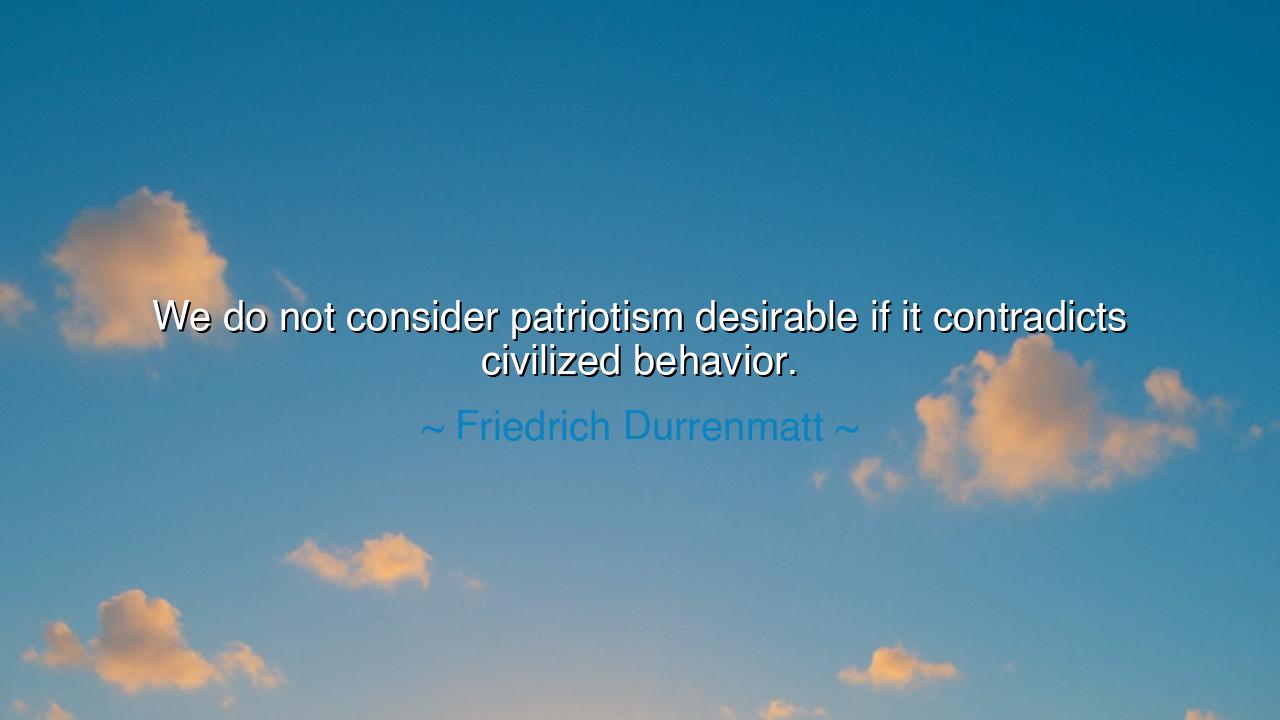
We do not consider patriotism desirable if it contradicts






“We do not consider patriotism desirable if it contradicts civilized behavior.” So spoke Friedrich Dürrenmatt, the Swiss playwright and thinker, whose words pierce through the fog of blind nationalism. In this statement, he draws a line as sharp as the edge of a blade: patriotism, though noble when pure, becomes dangerous when it abandons the principles of civilization. For love of country is not true love if it descends into cruelty, savagery, or barbarism. To honor the homeland by trampling the dignity of others is not honor at all—it is betrayal in disguise.
The meaning is both simple and profound. Civilization rests upon justice, compassion, and respect for human dignity. When patriotism demands that these be set aside—when it asks us to hate the stranger, to persecute the weak, or to exalt conquest above conscience—then it ceases to be patriotism and becomes idolatry. Dürrenmatt reminds us that true devotion to country must never be severed from the higher call of civilized behavior, for without morality, patriotism is an empty shell, easily corrupted into violence.
History teaches this with painful clarity. Consider Nazi Germany, where patriotism was exalted above all else, but twisted into a weapon of oppression. Citizens were told that their loyalty to the Fatherland demanded hatred toward Jews, conquest over neighbors, and silence in the face of atrocities. This was not patriotism, but the destruction of civilization itself. The flag was raised high, but beneath it, humanity fell low. Dürrenmatt’s warning resounds across time: any patriotism that contradicts the principles of human decency is not a virtue, but a vice.
Yet there are also shining examples of true patriotism in harmony with civilization. Think of Mahatma Gandhi, who loved India with unshakable devotion, yet declared that freedom must be won without violence. His patriotism never betrayed humanity; it was expressed through dignity, self-restraint, and nonviolence. By keeping loyalty to his nation bound to the higher law of civilization, Gandhi lifted both India and the world. His example proves that it is possible to love one’s country without losing one’s humanity.
The wisdom here is clear: beware of voices that call cruelty “loyalty,” or hatred “devotion.” When leaders urge us to abandon compassion in the name of patriotism, they do not defend the homeland—they degrade it. The strength of a nation is not in the ferocity of its exclusion, but in the justice of its inclusion. Civilization is the standard, and patriotism must serve it, never subvert it.
The lesson to be carried forward is timeless: let your love of country be measured not by the enemies you scorn, but by the humanity you preserve. True patriotism builds schools instead of prisons, fosters peace instead of war, and uplifts the poor instead of crushing them. When you find your loyalty pulling you toward hatred or cruelty, pause and remember Dürrenmatt’s words: such patriotism is no longer desirable, for it is no longer civilized.
Practically, this means living your patriotism through acts of compassion, justice, and fairness. Serve your community, defend the dignity of the marginalized, and refuse to support policies or leaders that mask cruelty with patriotic slogans. Celebrate your country, but never excuse its failings when they contradict the higher law of humanity. In this way, you honor both your homeland and civilization itself.
Thus, let Dürrenmatt’s warning echo as a torch across generations: patriotism is only worthy when it walks hand in hand with civilization. To abandon civilization in the name of loyalty is to wound the very soul of the nation you claim to love. Hold fast, then, to justice and mercy, and let your patriotism be not a cry of hatred, but a hymn of humanity.






AAdministratorAdministrator
Welcome, honored guests. Please leave a comment, we will respond soon